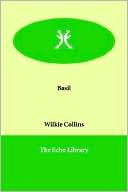

 |

|

The average rating for Basil based on 2 reviews is 4 stars.
Review # 1 was written on 2014-12-25 00:00:00 Jimmy Barton Jimmy BartonI am now about to relate the story of an error, innocent in its beginning, guilty in its progress, fatal in its results … All hail serendipity! I did not know of the existence of Wilkie Collins's novel Basil until a few days ago, when I finished reading William Godwin's Caleb Williams, and saw Collins's novel cited as analogous to Godwin's in respect of its subject matter. That prompted me to follow it up, and I'm very glad I did. The only works by Wilkie Collins I had read before are his great novels of the 1860s: The Woman in White, Armadale, No Name, and The Moonstone, all superb. Basil is early'it dates from 1852'and I can't say it is as good as the later works. You can see all the same elements here, but they haven't yet shaken down and resolved themselves into a harmonious composite; there is something jarring and excessive about this piece. On the other hand, I found Basil intriguing precisely on account of its unresolved quality. There's something wild and weird about it that appealed to me, despite its flaws. One thing I like very much about Collins's later novels is his way with women characters, whom I find far superior to those of his mate Dickens. I found Basil disappointing in this regard. The two main female characters here, Basil's angelic, desexualized sister Clara and his more equivocal love interest Margaret, are fairly stereotypical and stereotypically treated, even down to their contrasted colouring'Clara the pale and blushing English rose, Margaret ominously foreign in her dark and sultry looks. Enough already! Much more interesting, in terms of gender, is Collins's experimentation with a male protagonist at the extreme of femininity. If you were to total up Basil's and Clara's various moments of paleness, faintness, and general vapourousness throughout the novel, it would be a very close call. What I found mainly appealing in Basil is its odd combination of realism and social observation with a much stranger, Romantic and Gothic streak. This mixture is all the more striking because the Gothic emerges out of the realist and prosaic; we spend the first half of the novel in an entirely different world to that of the second. The first is a novel of social observation, set in an intriguingly transitional London, where ancient landed aristocratic families pursue their elegant lives in select squares, while nouveau riche tradesmen throw up flashy villas on the outskirts of the city, and dangerous novelties such as horsedrawn omnibuses bring the different strata of society into fatal juxtaposition. The second half of the novel, increasingly melodramatic, jolts us into a world of full-on romanticism, complete with dream-visions, foul fiends, fated revenge pursuits (the thematic tie-up with Caleb Williams), and numerous bouts of madness, illness, and violence. It's all a bit chaotic and feverish, but no one could accuse it of being predictable. And since the novel's shift in tone coincides with a catastrophe in the life of the protagonist, and we are seeing his life through his eyes, it can perhaps lay claim to a certain psychological realism. Basil is sometimes described as the first Victorian 'sensation novel', as I have discovered reading up on it since I finished the novel (there's a very good 2000 article available free online, , and I also looked at the 2013 The Cambridge Companion to Sensation Fiction). I hadn't really registered the sensation novel as a phenomenon before, but it seems useful as a way of making sense of the transition between Romanticism and the mature traditions of Victorian fiction. Perhaps that is ultimately what I like about this early example of the genre. You can see literary history here in the making, and with something still rather molten in the mix. |
Review # 2 was written on 2017-10-08 00:00:00 Ken Taylor-Mosley Ken Taylor-Mosley4.5 There is something I love about a Wilkie Collins novel. I think it is the way he builds the mystery and suspense without any overtly horrible occurrences. I thought Basil rather soft-headed and unsympathetic in the beginning, but as the story progressed, I began to feel real concern for this young man pretty much trapped in a mess of his own making. I decided early on that the father was not going to be as unforgiving as the son believed, but Wilkie Collins' characters seldom do what we think they will do (which is part of the enjoyment of reading him), and I found the father as exasperating as the sister was kind. The story depends very heavily on chance and fate to draw these tragedy-bound characters into one another's spheres. When you have accepted that element, you must concede that anyone would be as foolish and headstrong as Basil over a woman he can't even say he barely knows (as he does not know her in the least when he decides he is completely in love and must have her and no other). But, Collins handles this deftly and I totally believed the circumstances that ensued after the chance encounter of Basil and Margaret on an omnibus. The lesson here must surely be "never take public transportation if you can afford a private cab." I'm sorry it took me so long to get to this, but I am very pleased I put it on my challenge this year. I loved Woman in White and the Moonstone, so Basil is proof for me, if needed, that I should attempt to read everything in Collins' canon. Next up: No Name. |
CAN'T FIND WHAT YOU'RE LOOKING FOR? CLICK HERE!!!